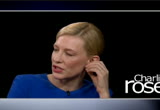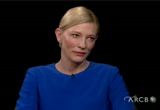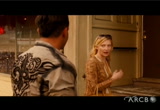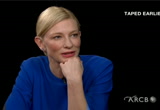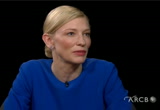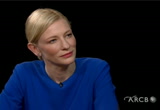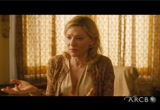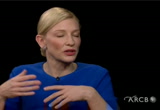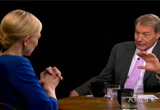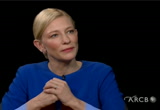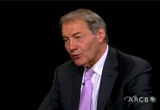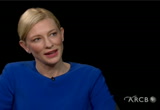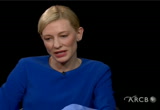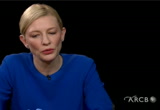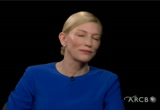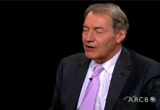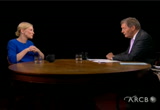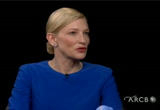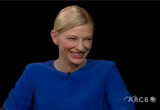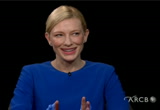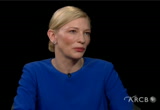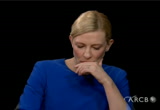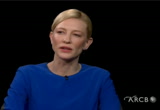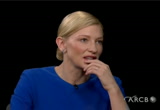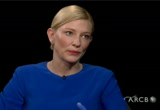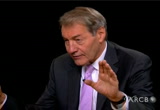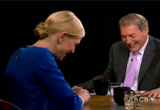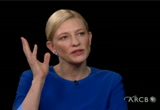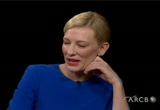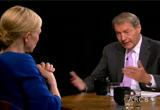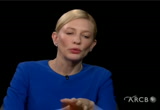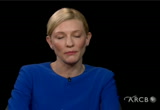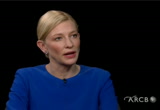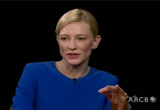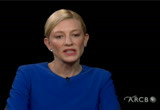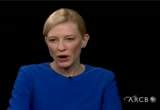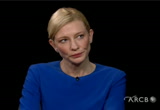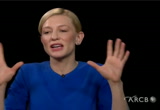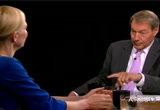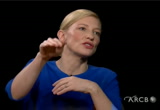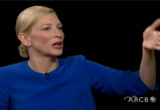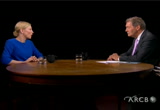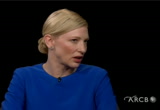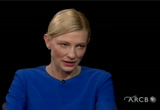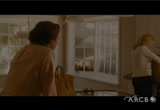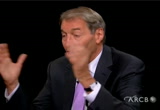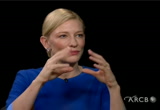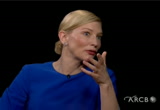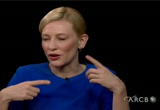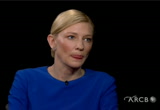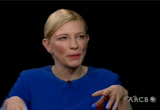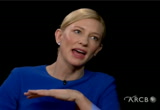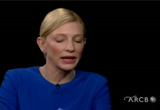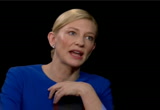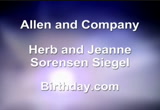tv Charlie Rose PBS August 21, 2013 11:00pm-12:01am PDT
11:00 pm
>> rose: welcome to the program. it's summertime, and we're looking back at some of the our most interesting conversations with the past year. tonight, we return to our recent conversation with kate blanchet. she stars in the latest film by woody allen "blue jasmine." >> it's also a wonderful australian playwright who unfortunately passed away, nick enwright. i encountered him at drama school, a very, very dear and special man. he went around table in our first year and said why are you here? and what do you want-- why are you an actor? and no one said it, but he said, "well, i actually--" we always came up with selfish reasons,
11:01 pm
11:02 pm
>> rose: kate blanchet is here. she is an academy award-inning actress. in "the aviator" she was kate hepburn. in i'm not there she was bob kill an, in woody allen's new movie, kate plays a woman on the verge. david benbee of the "new yorker" calls it "most complicated and demanding performance of her movie career." here is the trailer for "blue jasmine. let. >> what do you think? >> i love it! you spoil me so. >> who else am i going to spoil? >> he met me at a party and swept me off my feet. >> i fell in love with the name
11:03 pm
jasmine. >> no, i have never been to san francisco. i'll be staying with my sister. >> jasmine. look at you! >> your place is homey. >> the flight was bumpy. the food was awful. you'd think first class. >> i thought you were tapped out. >> i'm dead broke. really. i mean the government took everything. >> all i can say is you look great. >> oh, now who's lying? >> is there anything you want that you don't have? >> sweetheart, it's beautiful. >> when your sister had all that money she wanted nothing to do with you. now that she's broke all of a sudden she's moving in. >> she's not just broke. she's all screwed up. >> excuse me, are you talking to me. >> one minute you're on top of the world, the next, the guy turned out to be a crook. >> how long are you planning on staying with ginger? >> no one wants to get out of here as a matter o as a matter . >> i'm sure this is a big comedown for you. >> i want to to know i lost every cent of my own money. >> i was there a week and knew the guy was hitting on my
11:04 pm
girlfriend. >> i can't. >> you choose losers because that's what you think you deserve, and that's why you'll never have a better life. >> she doesn't care about you. she's a phony! >> you can please not fight in here. i don't think i can take it. for some reason, my zahnex is not kicking in. >> anxiety, nightmares, a nervous breakdown-- there are only so many traumas a person can stand before they take to the street and start screaming. >> rose: i am pleased to have kate blanchet back at this table. welcome. >> thank you. >> rose: tell me about jasmine. >> jasmine, well, there's a broken flower. ( laughter ) she's a very combustible cocktail of rage and guilt and is one of the most epic fantasists, brilliant creationologist the part of woody. >> rose: an actor's delight. >> yes, confused and complicated. she's broken and delusional, which is always fun to play. and someone with an incredible
11:05 pm
sense of-- a romanned sized sense of self. >> rose: she's an eastcider, married, husband turns out not only to be having an affair but a fraud and her empire collapses and she flees to san francisco, with her sister but not of the same parents. >> yes. >> rose: and what does she finds there in her sister and her new surroundings? >> i think she finds reality which she finds incredibly difficult to deal with. i mean, there's a long tradition, i think, in american drama, if you think about tennessee williams, of creating women, in particular, who walk that terrifying border between fantasy and reality and who choose to retreat into the fantasy because the reality is just too brutal. >> rose: that's what she does in san francisco? >> and the search fora husband. >> rose: and a new search for a husband, also finding fault with her sister's choice of men. >> yes.
11:06 pm
yes. which-- you know, it's not-- i mean, it's a series of revelations. i mean, i think she had no idea from jasmine's point of view, the depraved existence her sister was living in. >> rose: i don't know whether this has relevance or not, because of blanch-- >> i am awaited with blanch. >> rose: is there a kind of homage to women and understanding difficult women or women who are complicated in all those plays that somehow seems into this character on the part of woody who wrote it? >> yes, i mean, if you look at the panton of female characters he has createdly and the opportunities he's given to actresses, they're extraordinary. and i think this jasmine was
11:07 pm
certainly an extraordinary opportunity for an actress, and thank goodness he presented that opportunity to me. >> did i hear eddie say no to dennis looking for help. >> forget it. it's too menial! i'd go nuts. i want to go back to school. i want to get my degree and become, you know, something substantial. i can't just do some mindless job. i was forced to take a job selling shoes on madison avenue. so humiliating. friends i'd had at dinner parties at our apartment came in and i waited on them. do you have any idea what that's like? no, you-- one minute you're hosting women, and the next you're measuring their shoe size and fitting them. one came in the store and was so embarassed for me. she slipped out thinking i
11:08 pm
didn't see her. i saw you, erica! >> rose: did you talk about women and talk about how woman think and talk about-- >> did i talk to woody about the character? are you kidding me? >> rose: no, i'm trying to get to the truth of this. >> no! >> rose: i thought were going to say, "of course i did!" or "are you kidding me!" >> 97% of his direction comes-- like bergman he's an absolutely brilliant dramatist. he's an incredible filmmaker, unique and professional and rare. but it's all in the text. and, you know, he would tell you when it's not working, but he doesn't necessarily point nut right direction, and i think given this is the guy who made bananas and interiors, and andrew daisuke, and louis c.k.-- >> rose: who are both in there. >> and you think which way is this going to fall? i read the script and thought this is absurd and hilarious. >> rose: both comedy and
11:09 pm
drama. >> yes, and three weeks in, woody said to me, "you know, this is a serious movie." geez! if he'd said that it me on day one. that's what makes his films so edible, i think. >> rose: edible? >> yes, such a strong sense of audience. >> rose: you can chew on lemons, digest them-- >> he-- because he walks that line between the absurd and the painful. >> rose: between the absurd and the painful. see, this is what i love about you. that just comes rolling out, perhaps not having thought about it before. it is between the absurd and the painful. >> it is. >> gl clearly. >> life is an incredibly difficult thing. >> rose: really? i thought otherwise. do you find him in a particular interesting prld in his own life? he's 77 now. he's created a whole series of interesting women characters and you've played some of them? >> yes. >> rose: do you find him in an interesting period in his own life looking back a bit? >> yes.
11:10 pm
well, having not worked with him before, i mean, i only know the myth. i don't know the man so well. but he's voracious. he's not here. he's already in the south of france doing the next one. >> rose: he does one a year. >> yeah. i remember martha graham said this amazing thing, and maybe that's the point where i relate to woody as a-- you know, someone who has-- you know, an artistic and creative life. she said this fantastic thing about there's never, as an artist, there's never any satisfaction. there's just this eternal, constant rolling-- this is not a direct quote-- dissatisfaction. and that this kind of blessed, unrestfulness that keeps you-- keeps you going. >> rose: so what's the search? >> the search i guess is for that-- it's like being on a monkey bar. happiness, this whole cult of happiness. it's very rare. satisfaction just doesn't exist, and that you-- you hope to glimpse it. you hope there will be a moment where you think, that's not bad.
11:11 pm
>> rose: the reason i ask if he's looking back he's now sort of musing allowed maybe if he had it to do over-- and he says anybody who doesn't think about doing it over and doesn't think about regrets and doesn't know they made some bad choice along the line is just simply not in touch with themselves. do you agree with that? >> i'm not a big believer in regret, because often thigz i thought -- >> rose: not regret meaning dissatisfaction where you are now. just saying i made a choice, i might have made another choice. it might have been a bad choice. i don't sit here moaning about it. >> i think that's the awareness that time is finite. >> rose: i thought it was interesting that he said he might have become a novelist-- >> or a plumber. >> rose: you think that's simply-- you deflect the question by saying something. >> no, but when you are asked that question, you think i might have liked to have done that and there's no time to do that now. he is absolutely prolific, and i
11:12 pm
mean, you do feel on the set with him-- he's completely engaged and simultaneously disengaged from it. and i think that's what creates the unique text in his films is that -- >> rose: jut butt just tell me-- share the conversation you have with woody allen when you are making a movie of which you are the principal character? what's for dinner tonight? >> what's for dinner tonight? often he does have to rush away for a dinner date, so there's time pressure. not because you want to get it life, but he has other things. he has a life to lead. >> rose: he has. >> he's notoriously silent, and i don't upon how to work unless it's in dialogue with other actors and the director, so i'd ask questions and he'd answer them. >> rose: interestingly? >> yes, often cryptically. he's very-- once i was asking about a moment, and he said, "oh, it's--" he always said-- i think it's a painful process for
11:13 pm
him to listen to his own words back, particularly in the mouths of other actors who are constantly getting it wrong, and he was talking about what he'd written and he said, "it didn't look like much and it actually wasn't." ( laughter ) that's the way he talks about things. but you know, you know he's moving on, then you're on to something. >> rose: he's a man who likes women? >> i think he does. i think he really -- >> rose: someone like you would know that. >> i think he's fascinated by their complexity. you know, how-- how brittle, how bitchy, how extroverted they seem to be. but i did say to him that, you know, he seemed to have such a great empathy, perhaps is too sentimental a word, but an understanding of jasmine. i did say to him, i said, "had you considered playing this role?" and-- because when i asked him,
11:14 pm
i said, "how would you play it, mr. allen?" and he said... he knot quite -- >> rose: you said "mr. allen?" >> mr. allen. i always call him mr. allen. and he would just reel off a whole set of circumstances and possibilities because he was saying-- analyzing his own prism as a performer. that's the way we sort of ended up speaking about it. he said he did think seriously about it when i said why didn't you play jasmine and he said it would have been too comic. >> rose: i read that. "too comic." >> but he did seriously consider it. >> rose: do you think you understand men as much as he understands women? >> i'm not a writer. >> rose: but you're an interpreter. >> i've played a few traditionally male roles. and i think the great roles, great male or female roles, transcend gender. i relate-- i think i relate to
11:15 pm
men quite well. i have a lot of male friends. so -- >> rose: and you work with your husband. >> i work with my husband, which is a horrific notion for a lot of partners. they think how can do you that? >> rose: so has the sidney theater company experience made you want to direct? >> i've directed theater. if the right-- if the right film came along-- basically, i'm very impatient, and i understand the theater-- i understand how to produce theater and get it up, and it's not-- you know, i understand how to reduce the budget, but not creatively compromise the work. but the idea of sitting with something and going out and pitching it to people and getting to first base and then having to retreat from that because the finances-- before you even get on to set, there's, like five years of your life gone. and then you make it, and then you've got to sit with it, and then you've got to publicize the bugger. that is a lot -- >> rose: you have to sit with people like me, don't you? >> that's not too hard.
11:16 pm
but that is-- you have to really love that material. whereas, there's an immediacy to theater, and you know when it's connecting to an audience. you can go and give the actors notes and watch the scene escprofl grow. it's a very organic base, and there's something much more terrifying for me about directing a film because the object is so complete and finite. >> rose: but you seem to have an artist's soul. >> thank you. >> rose: no, you do. if you weren't this, you'd be a dancer or you would be-- >> i thought you were going to say a dentist. no, you didn't think i would be a dentist. the things you learn, the tthins you learn. >> rose: exactly right. you would be an artist. you would be a painter or dancer or-- i mean, you would not think of yourself as being a nuclear scientist. >> no. look, that's beyond my -- >> rose: or neuroscience. >> look at you. let's turn the tables, you went
11:17 pm
to duke university. >> yes, i did. >> and you were premed. >> rose: i was. >> and you were in law. >> rose: yes. >> and you segued into journalism. >> rose: i did. >> so no whereon's path is lin, linar. i think the landscape, the educational landscape has changed so profoundly, you know, in the last 40 years. i mean, even since i was at university. >> rose: how so? >> well, the sense of-- the idea of-- if i could-- i could start off in an arts degree, an arts economic degree, and then think i'll transfer to architecture or pick up some architecture units and try that out for a moment. maybe the american system does allow you to have a few different majors and combine but you've got to get through the door in the first place. when i started at university it was just when they were introducing high school educational phase and of course that's gone up. and there are very few people who ever reach the cusp --
11:18 pm
>> rose: i'll tell you what's interesting now about education is they're about ready to hit another zone in terms of online education. that's number one. >> right. >> rose: number two, online now, we can see the most extraordinary visual things as well as go inside the greatest libraries in the world. so that gives you a capacity to absorb new experience, you know, unleash the power of different people who can explain things to your own mind. >> yes. >> rose: so there's a capacity now because of the extraordinary world we live in to assimilate more things than ever possible before and that's exciting about an evolution of a mind and a life. >> yes, and then that certainly does democratize education. >> rose: exactly what it does. >> say, for example, with a medical degree, you cannot teach bedside manner online. >> rose: no, we can never do that. >> you cannot impart compassion. when you're in a lecture theater, you are learning to attend something, and you're learning-- there's the group
11:19 pm
mind of the students, as well as your individual mind, and i think that is really important because it puts your learning in the context of -- >> rose: i think bedside manner has to do with what the teacher has and every great speaker. it is somehow being able to connect individually with every student, with every member of the audience. and that has something about reaching inside of you, with respect to your own humanity, and being able to take that out and somehow connect, the engagement. what i do is the engagement is as important as the question. so that you have somebody who wants to wrestle with the question, rather than simply deflect it with certain varying degrees of skill. >> absolutely, it does. it makes complete sense. you made the right decision. >> rose: i think so. >> i'm trying to cheer you up, a little bit. >> rose: and damn it, you are! as you always do. so back to jasmine, and just to woody for a second.
11:20 pm
why is it everybody wants to work with woody, with mr. allen? why? is it by his reputation? is it a kind of word of mouth? is it-- >> i think it's both. i think, you know, actors have voraciously consumed his stories, the characters, you know, and there's a whole mythology around the way he works and he's such an enigma, so well known but so unknown. but i also think a lot of-- well, i can only speak for myself, but it's-- there's a terror in it. you know, you're attracted to what you-- you think -- >> rose: you said that before to me. you're-- >> and i think there's this, you know, the rumor abounds that if he doesn't like you, then he'll recast. >> rose: you mean he'll recast around you or recast the film?
11:21 pm
>> it's called being fired. >> rose: oh, that's what i thought. so people come in to do a film with him and all of a sudden it doesn't work. >> it doesn't work and because he doesn't-- you know, he's not interested in trying to put band-aids on things. if it's not working, he'll jettison it. i guess it's from his stand-up days. he's brutal about that. if it doesn't work cut it. moving on. that's not working. he's not one of those directors who wants to break the moment open and help the actor get there. you're either there or you're not. >> rose: i hired you because you're an actor, thank you very much. >> yes, good-bye. but i think there's-- that's what clowning is, that's what stand-up is. you can get very surrounded in cotton wool as an actor working in film, sort of protected from that sort of interface with the terror, and i think that's what woody presents you with. it works or it doesn't work. >> of course not. what on earth makes you think that? >> well, someone made a remark. >> what remark. >> they saw you having lunch
11:22 pm
with her, taking her hand. >> oh, what crap. who told you that? i know who, it was that vacuous trouble maker lydia. it had to be lydia. >> did you? did you take her hand? >> are you nuts! do you think if i was having an affair do you think i would be crazy enough to have it at the 4 seasons. >> i don't know. maybe you were high. it's obvious she has a crush on. >> kruger building a case. >> if you were having an affair i would be upset. >> rose: what are you scared of? >> i'm scared of everything. spiders. >> rose: i don't mean insects and things like that. i mean about life. >> i don't know -- >> rose: not failure. certainly not failure-- >> oh, i'm terrified of failure. >> rose: are you? >> absolutely. maybe it's that perverse compulsion to push myself toward it, to-- look, i experience it all the time. i'm constantly disappointed with
11:23 pm
what i did. i mean -- >> rose: are you satisfied with what you do? >> well, no. i agree with martha graham. i think it's an internal dis"discovery" satisfaction. otherwise, why would you keep going. >> rose: you say i never got there? >> yeah gll it's okay, though. >> yeah. >> rose: because the journey is what it's all about. >> well, exactly. exactly. and, you know, i've been so-- suknow, as you have done, i didn't set out to get there. >> rose: i didn't, either. and i couldn't even imagine being here. you can't imagine wherever it is you know it's a process. you know it's a journey. you don't know where you're going, but you could never have imagined being where you are now. >> no. >> rose: you didn't think of yourself when you first began to think of acting run the sidney theater company. >> that's why wheremy husband and i got our first jobs, not at all. and the-- it was so out of the ballpark of what we were expecting to to do in the next five years we had to say yes. >> rose: i may have gotten this wrong, but i think you once
11:24 pm
said to me-- is his name upton-- >> yes. >> rose: said to you-- i think you said it to me-- after you hit it, after you were a star "go for it, kid. you've got five years." ( laughter ) "go get it." they allowed you in the room. have at it. >> enjoy the five minutes. but, no, he's-- andrew is fantastic. he's a great leveler. an incredible support. but he's also very-- you know, he's also, you know, living life while it's there. often i think i can-- maybe it's because i'm sort-- i don't-- he's a pessimist, i'm a pessimist, optimist. but i'm always thinking, well this is it. it's all over now. so i better not enjoy it too much because once it goes away then, you know, i'll be disappointed. >> rose: how about the three boys? >> they're heaven. >> rose: heaven? is that what it is?
11:25 pm
heaven? what's heaven? >> i think it's the smell of a young boy, although my 11-year-old is reaching puberty, so that smell ain't too heavenly, let me tell you. they're great. when we were filming "blue jasmine" they came to san francisco, and they're a great leveler. i mean, i think -- >> rose: they are the ultimate leveler. >> yeah, i mean, look at-- i mean every woman's relationship to what she does, her work is different. but for me, having children has forced me to become much more economical in the way i approach my work and much more pragmatic in the way -- >> rose: meaning more efficient, meaning-- >> all the things i thought were utterly essential and frankly pleasant-- the reading around, the researching, the mulling over-- i actually have to do in my sleep now. >> rose: because there's no time. >> yeah. >> rose: and the time weak is dedicated to them in part because it brings you such joy. >> yeah, and look, i think it's been great for them, for us to run the theater company, because
11:26 pm
back stage, theater people, you know, it's a very playful place, very, you know, inviting place for a child to be. >> rose: do they think about, you know, that inevitable question about, you know, like mom and dad, i, too, want to be on stage? >> i know. if you're a doctor or a lawyer, i think probably you'd be thrilled if your child went into-- you know, but as for working in the arts -- >> rose: if you're captain of industry, that seems better to have your son or daughter to be there. >> it's expected. >> rose: think murdoch. >> yes, yes. but as someone working in the arts, you know the difficulty and the rocky terrain and the lack of certainty. not that anyone has career certainty. >> rose: someone said to me they basically took this tact-- if your child or childrenmented tchildren wantedto go into the - theater-- do everything that you could to dissuade them because if you are unsuccessful, they're
11:27 pm
made for it? >> yes, yes. i mean, i-- i personally that was my experience. i went right away from it because i didn't consider one could make a life out of it. i loved it. i thought it was more a hobby. it has to be a vocation because-- you know, there's a lot of disappointments, and -- >> rose: i just don't imagine you as a woman with disappointment. >> well, no, i'm quite-- not so much in other people but i'm constantly disappointed -- >> rose: in yourself. what could you possibly be disappointed about? >> what am i good night? i'm actually disappointed in this cup of cove right now. >> rose: i knew you would say something silly. you deflect the question if you don't want to deal with it. >> i'm not that deep, charlie. >> rose: yes you are. you know how i know? because of language, your command of language. >> i only speak the one. ( laughter ) >> rose: at a time. >> at a time. >> rose: one at a time. >> my manned 'd mandarin's a
11:28 pm
bit rusty. >> rose: but cantonese can be quite good. did you try cantonese. >> no. is it easy? >> rose: it's really hard. i mean, i had a hard time with mandarin, but cantonese after having-- >> you speak mandarin? >> rose: no, of course not. >> you read it? >> rose: no, i lie about it. >> on public television. >> rose: on public television, and then acknowledge it as they say. >> my oldest son is learning mandarin. >> rose: truthfully? >> yes, he is. >> rose: and because you-- why? i think this is wonderful. >> well, it was just -- >> rose: 11! >> at school. >> rose: oh, at school. the school he's going to, they select mandarin for him? >> yes, mandarin is the one they're doing in primary school. >> rose: oh, really? >> yes. >> rose: so it's english and then mandarin? >> yes. it's not a bilingual school, but he loves it because they learn it orally. >> rose: that's the way to learn it, obviously, isn't it? >> they're teaching him in a good way so it's fantastic.
11:29 pm
>> rose: does he have anybody to speak mandarin with when he comes home? don't you have a nanny or something that speaks mandarin, for god's sake? >> that was my mandarin. it meant my good son. >> rose: what does it mean in mandarin giprobably remembered the wrong -- >> rose: don't embarrass yourself. >> i just did. i don't know what it means. >> rose: but he seems to respond to it so it must be okay. >> doesn't it? >> i think it means, "my dear boy." but i might have just -- >> rose: will you always live in australia? >> who knows? we fantasize about having a sabbatical. >> rose: from the theater or life? >> from life, yes. >> rose: a sabbatical. john lennon said life is what you do while waiting for something else to happen. >> well definitely for the-- it's been a wonderful thing to reconnect with the creative
11:30 pm
community there through running the sydney theater company. we don't want to sever that. it is still a great place to grow up. and the distance-- i found this, the distance from the rest of the english speak world, of course, there's the pacific islands and there's new zealand, but we are essentially geographically part of asia. the relationship functional and dysfunctional between the white australians and the intiginous community, i mean, it just is a-- it produces very interesting tension in australia, i think. >> rose: interesting. >> to be-- you know, to live a creative life there. >> rose: you know, the cultural places are always fascinating. >> yes. >> rose: in terms of how it shapes and how those tensions play out in relationships. >> and what was also wonderful going back-- we lived in england almost a decade-- we were cultural tourists there. we had no sense of-- in a good way-- sense of responsibility to
11:31 pm
the creative community there because it wasn't where we were from. >> rose: and exactly thes on in australia. you have a sense of the responsibility, the creative community, because that's where you were born, born into that community. >> that was a big deciding factor for us in going back. >> rose: when you look at what you're doing now, you also did "maids" which is the story of two maids who-- based on a real story. >> ya murder -- >> rose: based on-- the family was called papine? i've forgotten what it was. >> the papine sisters. q. and they did what?>> there wd by kamu and snatra and jenae, the pro letariats were rising up against their operezzors, the
11:32 pm
sisters in the dark finally couldn't stand it any more and murdered their mistress and their daughter with claw hammers, claude out their eyes. it was a brutal, brutal murder. these maids are desperate to release themselveses from the stronghold of their madam. >> rose: tell me how you approached that character? >> well, with isabella -- >> rose: she's very young, isn't cindy sheehan plays the mistress. >> she does. it's also eye mean, i-- anyway i
11:33 pm
was saying-- but it was-- look, iozdon't have any preconceptions going into a rehearsal. >> rose: i want to know. it's my one time to ask you about a process. we just defined the character. there's jasmine, which you said essentially you derived from the text is what you said. is that it? >> i think i'm always work from the text, and andrew upton and benedict andress who directed it -- >> rose: andrew upton did? >> yes. often estates, like the jenae estates can be quite descriptive-- and the version was done in the 50s so it's very much out of that social conditionings and framework and so it was great to breathe new
11:34 pm
life back into it. the play is so transimpressive. >> rose: what does that word mean, "transgressive?" i'm serious, i don't know. >> for me, what it means is that there's a certain-- a certain understood moral code of the way people function. >> rose: ah. >> and there are certain boundaries through which people-- even in a check-off, there's a framework for which you have to bounce back off of, and you bounce back into the world. i find when you actually look at jenae i feel so absolutely bougoise, and closeted in my existence. he said his greatest fantasy was to be on a train to siberia being the lover of his mistress'-- of-- the rent boy, basically, of the mistress' lover. ( laughter ) you think -- >> rose: how do you get your mind around that?
11:35 pm
>> it's very-- it's very elliptical. the whole thing about stockholm syndrome, loving your oppressor. it's just a fear of the desire and the hatred of the oppression but the actual willfully enablinabling it to continue. it's a very sort -- >> rose: how did you approach the character? >> from the beginning. i mean, because it's a series of games within games within games. it wasn't really until we became the maids-- of course i play claire, and she impersonates the mistress. we didn't know what that was until the mistress had come in and we were the maids. so we had to sort of start from the concrete and blow it up. it ended up being intensely physical. it's a very dangerous play. i mean, it's all about my character ends up because of her sisters' intense fantasy to be the criminal, and the criminal being akin to being the saint.
11:36 pm
un, the ultimate glory is to commit murder mis a very transgressive idea still now. >> rose: it's a political idea. >> it is a very political idea. and the only way because the more dominant sister is perhaps the more cowardly and weak one. the only way to give her that fantasy and reality is to allow her to murder my character. >> rose: it's fascinating to hear you talk about it because in a fundamental way, that's what some people in terrorism have to come to grips with. >> yes. >> rose: that very thing, the crime is a political act. >> yes. i mean, it's-- it's out-- that's what i mean by transgressive. it's almost like we need to grapple with what that actually means or how someone can get to that place and until we understand that, how can you dismantle it. it's almost like it's too transgressive so we just look at
11:37 pm
it. we label it as being-- i'm not condoning it, but you have to understand these things. you have to unravel it. >> rose: unless you can't. >> and that's great -- >> rose: you can't kill them all. >> no, no. >> rose: whatever it is. >> no. i mean, it's-- we're all indock rinnated -- >> rose: there's no finite number. >> no. >> rose: do you have any interest in somehow creating film, theater in which you-- the whole process in terms of using what you have to write and create a theater piece that speaks to your own view of the world and-- or some passion for-- >> you mean for me to actually -- >> rose: i mean for you what jenae does d. >> i'm married to a writer but i'm not-- i'm summer not a writer. i have a great respect for great write glg not a writer meaning
11:38 pm
you can't or you have other things that have a higher calling for you? >> i just don't have the skill. >> rose: just the skill. >> yeah, you know like i can go to a life drawing class for the rest of my life but i don't think i'll particularly improve. >> rose: have you been to a life drawing class? >> i have. >> rose: you tried? >> i keep saying i'm going to go back and do it. there's a medication in it. >> rose: and what? it didn't come easy, so, therefore, you abandoned? >> i understand space by being in it. un, the-- i understand what it means if you're standing downstage left, the vibration are different from when you're standing center stage. and the whole balancing of the space. like-- i mean, if i had my time over, talking about woody allen's regrets, i would have loved to have -- >> rose: choice. >> yes. i would have loved to have been a botu dancer or-- it's
11:39 pm
intensely physical. it's almost like performance art in a way but at the same time you're emotionally engagemented and physically engaged. but that's, obviously, not going to happen at this point. but to actually understand space in the sense that, that's over there, and i'm going to render it on a two-dimentional surface but i'm going to make it three-dimensional, i can can appreciate it, but i can't do it. like, believe it or not, i'm never going to be a neuroscientist. >> rose: no. ( laughter ) well, but that takes-- >> not now, anyway. >> rose: there's always grandma moses. it's never too late. >> it's never too late. >> rose: i also think there's something attractive-- bart jof giamatti, president of yale, died, sadly, and went on to be commissioner of the national league, rather than the american league. but he famously said that, you know, you shouldn't stay in one job more than eight or 10 years
11:40 pm
because in a job that had-- like the theater. they might say you guys shouldn't do that more than eight years because in eight years, you will, in a sense, have a chance to experiment with all your ideas, and then you're in a sense responding to what you have done-- do you understand what i'm saying jew never want to be in dialogue with yourself. >> rose: exactly! >> you always want to be reaching for something else. >> rose: that's what i mean about command of language. you're summing up what i'm struggling to say. you don't want to be in dialogue with yourself. >> it's boring. and i think creatively you end up cannibalizing yourself. and i think you're right. for
11:42 pm
and if it's virtually created, then can't anyone do that? and is the artist actually-- you can't see the handprints on it anymore. and so, therefore, "to talk about the craft of acting somehow seems sort of worthy or old fashioned. but for me, in answer to your question, i think that acting has to be-- and this is why the theater is-- you know, it's such a great place to be and when it's great, it's great for an audience, and when it's awful,
11:43 pm
it's awful, because it's live, and because it's human. and it's-- and they're the two things that have to claim if it's going to survive. it's a generous act-- and this is where woody is amazing. he innately understands his audience. he does it for people it see. he wants to entertain them. he wants to move them, and he wants to make them laugh. and that's what you do on stage. and i think that you can get quarantined or very separated from, you know, in various different forms of a moving image, from the people that you're actually making it for. and a lot of times i think people end up doing it for themselves, which, you know, of course there's a selfish component. i wouldn't be doing it if i didn't get pleasure out of it. but it has to be generous, and if it's not working on stage, the audience-- you can feel it. you can-- they may not even make a noise, but the energy retreats
11:44 pm
so you have to change up what you're doing. it's a dynamic relationship. >> rose: is this what it seems to me like-- it's almost like breathing. if you're connecting, they're breathing with you. there is a sense that-- >> exactly. >> rose: they're exactly where you are. >> yeah. >> rose: almost of it's almost they can laugh before the words get out of your mouth or feel the emotion as you feel it. >> i agree. and you can-- you can-- you can feel the intake of breath. it's a very dynamic relationship you have with the audience. and it's something that-- that you don't really want to concraitize and label. it's a transference of energy. and that's why-- i'm not interested in katowski, locking yourself away in a room. it's not theater as a laboratory. although development, and development away from audiences, a vital part of preaching the stage where you can actually perform the thing for people.
11:45 pm
no, i relish that audience connection. so maybe that's why i do it. and it's also although a wonderful australian playwright who unfortunately passed away, nick enwright, when i encountered him at drama school, a very, very dear and personnel man, said to us-- he was went around the table in our first year and said, "why are you here? what do you want-- why are you an actor?" and no one said it, but he said, "well, i actually--" we all came up with selfish reasons. and he said, "i think acting is revealing to people what it means to be human. and ihuman." and it is a human thing. and that's why maybe i keep doing it, because it's-- it humanizes me. >> may i ask you something? >> sure. >> you ever think you could see yourself married to me? >> married? >> i-- i have it all planned. obviously, you can say no if it
11:46 pm
sounds terrible, all right. but will you come with me next month to vienna, we live there for a few years, and i can teach you how to wattle and you can have all the chocolate cake and wine we want and i come back and i get serious about my political dream. and we adopt kids, and we live in the house that-- >> adopt kids? >> a fan tosk job making beautiful. what do you think? look, the downside for you is you have to stand next to me and smile at photo ops, when i throw my hat in the ring. >> you're saying you love me? >> i hope i didn't cause you to become ill over the prospect of becoming my wife. >> rose: a lot of these things, it is biological. it has to do with neuroscience thas to do with nurons and cells and it has to do with pathways and it has to do with a whole range of things, how the act-- the act of perceiving.
11:47 pm
>> it would be interesting to do a study on someone while they were perform glg exactly! exactly right! that would be stunning. >> speak of martha graham again, but she talks about the-- keeping the channel open. and, you know, there's no point in judging-- there's no point in judging what it is you're doing. you've just got to do it. you have to be open and available to what happens in the moment. and i think as an actor-- and this is why i think so many of us go a little bit potty. loo-loo! as you get older, if you have to-- in order to keep performing, you have to keep some of the synapses open. you have to disconnect them because it's in that space. that's where the imagination is born. >> rose: that's exactly right. and the interesting thing-- if you could do this in actor's head, it would be wonderful, and there are certain ways to do this, i would assume, you would
11:48 pm
see differences and it would be telling in terms of opening up presidency that's part of what they can do with diseased brains is monday the differences and see what kind of physical manifestation-- >> i should give my body to science. >> rose: you should do what your body does exactly now. while i have you here, i want to do this-- theater and film. hutrepidation about going into film because punlike theater where you began, they shot it out of order and all that stuff. did you get over that? did you figure out a way to do that in your mind that made it-- >> you are to think like a child. i think that's where having children helped. i remember being on set and he was reading a whole lot of russian novels between takes, and i thought how can he do that? because i have to be so focused on what it is i'm doing. because it's all out of
11:49 pm
sequence. somehow you have to have the ability in film to switch on absolutely and switch off absolutely. >> rose: so you have to remember sort of the narrative of the work if it's a film, the beginning, the middle, the end, and where-- but you values to keep in context where are you supposed to be at that moment in that narrative? >> yes, i mean, that's where-- say, for example, working on something like "blue jasmine" because the script was so impeccally structured even though there's not a lot of on-set dialogue with woody about it. i had to do a lot of preplank-- obviously she was on a cocktail of xanax and alcohol. when she was on it and when she was off it. and a lot of that charting for me comes in your costumes and wardrobe fittings because you have to work out-- it sounds very shallow-- where you're wearing what where and that sort of anchors thee mee. >> rose: i think olivier said until he put on the costume, he
11:50 pm
didn't really know the character. >> yeah, you get to-- because often in the hair and makeup test, the camera test. no one is looking at you. they're looking at the way the light is playing on your face. you can try things out and experiment. maybe it's coming from the theater. it's just that thing of having to make the space, whether it's when you're doing the blocking rehearsal or in the camera test or wardrobe fitting, just to rehearse, to play. >> rose: the more you know, the easier it gets, or the more you know, the more than difficult it gets? >> i think the more you know the more difficult it gets. and i think once you've arrived at a certain place, or a perceived to have arrived at a certain place, i think-- you have-- it's harder and hard tore keep taking those risks. q. because you're playingagains? >> no, because i think there's a sense that you've-- when you walk through the door, if you walk through the door playing queen elizabeth, then that's the way people expect you to keep walking. and so it's harder for you to
11:51 pm
say, actually, i'm not interested in coul doing that. i want to do that. and to keep sort of pushing yourself into places that may not necessarily be well received, or necessarily even work. >> rose: do most directors in terms of whether it's film or theater-- let's take film-- when you come to the role, do they have in their mind a sense of what they want it to be, or do they say, "i want you to surprise me and show me what it is." >> certainly in the the theater, you know, before i was ever in a rehearsal i thought you were told where to stand and what to do. >> rose: and what is in the actor's head, the character's head. >> i always screw up right royally on the first day to make a sense that you can-- you can muck up because it's often in those apparent mistakes or moments which seem deeply inappropriate that doors open and you think that's an interesting unexpected way to go through that. but woody has a clear sense of-- he has a clear sense of what he doesn't want.
11:52 pm
and i think he does like being surprised. he gives the actors a lot of agency. >> rose: mike nichols said that to me. he said what a great actor does is what a good architect does. you say to an architect, i want this house like this. a great architect will surprise you with what he will deliver or she will deliver after you have told them some sense of the place where you live and so will a great actor. >> i want six bedrooms but they can be configured in many different ways. >> rose: yes, yes. >> you just made monument with george clooney who wrote and directed and produced it with grant. >> yeah, and they're such a great team. >> rose: they're a good team. >> they're such a great team. there's such an elan to the way they work, it's easy and simple and unneurotic and the story of that-- i mean, it's a -- >> rose: what i find
11:53 pm
interesting about this-- robert edsel is the author. >> yes. >> rose: he saw i mentioned it in some totally unknown capacity-- not about the movie-- but just mentioned it-- john goodman, who is in the film, i said, george and robert edsel wrote me the book and he wrote a note, it's a remarkable story about this group of people who went out in search of the art that had been stolen by the nazis in italy? >> all over europe. >> rose: all over europe. >> basically they pilfered all the major jewish collections. >> rose: in vienna-- >> hitler himself was a frustrating artist. >> rose: and goring was worse. >> goring wasn't an artist at all. his paintings were serviceable. they were fine. but he wanted to build the largest fine arts musume in lintz, his home town. he wanted to level lintz, and
11:54 pm
completely redesign it. there's a psychology there, there's a grudge. and so they were unmassing all of this in an annex off the louver, and a woman called rose venont, unbeknownst to goring, who was using it like a shopping mall for his personal collection because the nazis-- and this is stuff i discovered making the film-- the collection of art, good german art, it was a sanctioned pastime, so you could go and raid a jewish household and take what you wanted. so what rozsivalon was doing, was catalog ago unbeknownst to the nazis, was all of the works, and the monument had to enemy to get the key -- >> rose: this is an ongoing story, an ongoing story because there are still lawsuit about all of this, the art that was stolen and where it is.
11:55 pm
in a totally different way, too, it is the sense-- we're now seeing stories-- there was a story in the "new york times" today in a very nice and an interesting way where someone with resources is going out and sort of quietly buying up some of the world's great art. a remarkable story. thank you for coming. it's a pleasure to see you. kate blanchet for the hour. thank you.
12:00 am
54 Views
IN COLLECTIONS
KRCB (PBS) Television Archive
Television Archive  Television Archive News Search Service
Television Archive News Search Service 
Uploaded by TV Archive on

 Live Music Archive
Live Music Archive Librivox Free Audio
Librivox Free Audio Metropolitan Museum
Metropolitan Museum Cleveland Museum of Art
Cleveland Museum of Art Internet Arcade
Internet Arcade Console Living Room
Console Living Room Books to Borrow
Books to Borrow Open Library
Open Library TV News
TV News Understanding 9/11
Understanding 9/11
